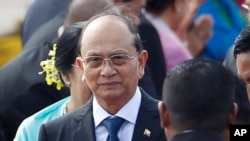RANGOON —
Burmese President Thein Sein, who has steered a wave of reforms since the end of military rule, will not be seeking a second term at the next election in 2015, the leader of his party said on Thursday.
Thein Sein has been lauded internationally for his economic policies, prisoner amnesties, and peace deals with ethnic minority rebels, but last year said a second term would depend on whether the people wanted him to stay and if he was physically able to do the job.
"President U Thein Sein has told me he will not run for the president," said Shwe Mann, the speaker of parliament and leader of the Union Solidarity and Development Party (USDP), using the Burmese honorific U.
"I think he meant what he said. He is not running in the election."
The 68-year-old is widely believed to have had a pacemaker fitted to assist his heart.
Shwe Mann, who out-ranked Thein Sein in the former junta that was disbanded in 2011, is also regarded as a moderate with reformist credentials, who enjoys good connections in the military and the respect of lawmakers. He has made no secret of his desire to run for president himself.
Shwe Mann took over from Thein Sein as USDP leader this year and analysts say the likelihood of him becoming president hinges largely on the extent to which the country's constitution is amended. A panel of 109 lawmakers is reviewing the 2008 draft.
The hugely popular Nobel laureate and opposition leader Aung San Suu Kyi is expected to run, but only if the constitution is changed to eliminate a clause that bars Burmese from the presidency if their children or spouse are foreign nationals. Her two sons are British, as was her late husband.
Speaking to reporters in the capital Naypyitaw, Shwe Mann also said former junta supremo Than Shwe was concerned things "might go wrong" in Burma. He did not elaborate.
"He's watching developments in the country with keen interest," Shwe Mann said.
Than Shwe was reviled by most Burmese during his nearly two decades of brutal control over Burma and his disappearance from the public eye has fueled constant speculation about anything from his death to an assumed behind-the-scenes political role, which Shwe Mann dismissed.
"The senior general doesn't have any intention to be involved in politics," he said. "Even if he had, it would be quite impossible to do it in practice."
Thein Sein has been lauded internationally for his economic policies, prisoner amnesties, and peace deals with ethnic minority rebels, but last year said a second term would depend on whether the people wanted him to stay and if he was physically able to do the job.
"President U Thein Sein has told me he will not run for the president," said Shwe Mann, the speaker of parliament and leader of the Union Solidarity and Development Party (USDP), using the Burmese honorific U.
"I think he meant what he said. He is not running in the election."
The 68-year-old is widely believed to have had a pacemaker fitted to assist his heart.
Shwe Mann, who out-ranked Thein Sein in the former junta that was disbanded in 2011, is also regarded as a moderate with reformist credentials, who enjoys good connections in the military and the respect of lawmakers. He has made no secret of his desire to run for president himself.
Shwe Mann took over from Thein Sein as USDP leader this year and analysts say the likelihood of him becoming president hinges largely on the extent to which the country's constitution is amended. A panel of 109 lawmakers is reviewing the 2008 draft.
The hugely popular Nobel laureate and opposition leader Aung San Suu Kyi is expected to run, but only if the constitution is changed to eliminate a clause that bars Burmese from the presidency if their children or spouse are foreign nationals. Her two sons are British, as was her late husband.
Speaking to reporters in the capital Naypyitaw, Shwe Mann also said former junta supremo Than Shwe was concerned things "might go wrong" in Burma. He did not elaborate.
"He's watching developments in the country with keen interest," Shwe Mann said.
Than Shwe was reviled by most Burmese during his nearly two decades of brutal control over Burma and his disappearance from the public eye has fueled constant speculation about anything from his death to an assumed behind-the-scenes political role, which Shwe Mann dismissed.
"The senior general doesn't have any intention to be involved in politics," he said. "Even if he had, it would be quite impossible to do it in practice."





